5 things to know before buying a hotel

There is no business like hotel business and with over 100,000 rooms available Australia-wide every night, it is clear hotels are also big business.
If you’re tossing up the idea of investing or simply purchasing a hotel to run yourself there are some important questions you should ask to make sure the property is a good choice.
When reviewing a new hotel investment opportunity, JLL Hotels and Hospitality Group’s Nick Roche says there are five main things to focus on that will help gauge not only the property’s current value, but whether it is a good long-term investment with potential to grow in value.
- Historical trading performance and how many rooms are booked per night – This will give you an idea of how the business or current hotel operator is performing and whether there is room for improvement.
- Condition of the asset – It is important to critique the property and clearly understand whether there will need to be additional expenditure in the short or long term to maintain the property or add value.
- Check out the direct competition and future projects in the pipeline nearby – To make sure there are no major threats and identify how your hotel can compete with hotels nearby.
- The current arrangement with the hotel operator – This will impact the income of the property as well as the longer-term reputation of the site.
- Look at the properties potential and what can be achieved if the asset is enhanced – You are purchasing a hotel for now and the future so potential upsides could result in better value down the track and should be considered when assessing value.
How important is return on investment (ROI)?
Like all commercial property investments, return on investment is typically “the primary measure of pricing and investor interest”, JLL Hotels and Hospitality Group’s Nick MacFie says.
“It will also likely dictate the level of debt finance available and the ability to meet loan covenants,” he says.
“However, given the dynamic income profile of hotels, buyers will often price an asset on the ROI under their ownership, not necessarily on how the asset was performing at the time of sale.”
You will need to analyse whether the hotel is performing to its full potential and the cost and benefits of an alternative management structure if it were put in place.

Calculating the potential return on investment is important. Picture: Martina Gemmola.
How much should you pay?
When it comes to how much to pay for a hotel asset there is no easy equation to identify the price tag.
In fact, Roche says the “right price” will differ for various potential investors and owners depending on their goal.
“For hotels, pricing is typically determined through an initial yield or discounted cash flow analysis,” Roche says.
“However, considerable attention is also paid to ‘price per room’ and how this relates to other comparable sales.
“We note that the pricing of hotels often extends beyond the financial aspects of the deal, and takes into consideration strategic aspects such as gaining a flagship property in a certain location, improving economies of scale across a portfolio, or the rights around control and influence over management.
“Everyone has a different ‘right price’.”
Running a hotel yourself
Many Australians dream of owning their own hotel and also being in control of the day-to-day operations.
But it is important to not get swept up in the romance of the idea and analyse the purchase carefully.
First, you need to consider the location as this can determine the success of your business regardless of whether you are in a quaint rural town or located in the inner city.

Hotels can have hidden costs for operators.
Before purchasing, research how much you can charge per room per night, how often the establishment is booked out and whether there is potential for multiple streams of revenue, i.e. hotel rooms as well as a bistro.
It is also important to establish a comprehensive business plan with your short and long-term goals.
Finally, above all, do your research.
Speak to current smaller hotel operators with similar businesses and find out what running a hotel is really like. That way you will be less likely to run into any surprises.
Hidden costs and challenges of running your own hotel
Operating a hotel is not as simple as buying the property and opening the doors – there will be plenty of hurdles and costs along the the way.
The first port of call is to ensure all the right council permits are in place to operate an accommodation business before you buy.
If you are offering food and beverage, you will also need to comply with food safety laws and regulations and work safety regulations if you have staff.
Another hidden cost is marketing. Hotels need to advertise to get business and this should be factored into the budget, including the cost of paying commission to major hotel booking sites.
Also, don’t forget to factor in general maintenance, cleaning, breakfast costs and the price of your hotel booking system. These all add up and can impact your bottom line.







